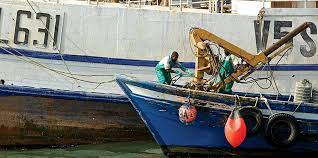Rudolf Gaiseb
Former fishermen who receive a N$4 000 stipend under the Government Employment Redress Programme have expressed gratitude for the remuneration, but said it is a drop in the ocean.
They said it is barely sufficient to meet all their needs.
The former fishermen lost their jobs in 2018.
The job losses in the sector are squarely blamed on the Fishrot scandal, wherein the nation’s fisheries resources are said to have been looted at industrial proportions.
They claim that the money they have been receiving since 2020 is not enough to live on for themselves at Walvis Bay, or to maintain drought-stricken households back in their home villages. This information is revealed by the recently-launched report titled ‘Right now, I cannot survive’.
It describes the legacy effects of the Fishrot corruption scandal on fisheries workers’ lives.
“They would rather prefer the government to find a way to enable job-creation, or assist them to move on by funding small business ventures or income-generating projects that would assist them in getting back on their feet,” the report indicates.
This publication early this year reported that the fisheries ministry, in collaboration with the labour ministry, launched the programme to address unemployment among fishermen.
The programme received criticism both from the public and fishermen, who regard it as ineffective.
The unemployed fishermen expressed dissatisfaction with the way the fisheries ministry dealt with their employment issues after retrenchment.
Most former fishermen who were interviewed at Walvis Bay made it clear that they do not consider the town their home,or place of permanent residence.
The north-central regions of Ohangwena and Omusati are their home regions, accounting for over 60% of fishermen workers. Oshana and Oshikoto are major source regions for the fishermen.
Findings
In this second phase of the Fishrot human rights’ impact assessment, the Institute for Public Policy Research (IPPR) interviewed 90 former fisheries workers.
The findings reveal that most of the affected former fisheries workers are unskilled or low-skilled migrant labourers from rural and mostly-poor communities across the northern stretches of Namibia.
Most of the former fisheries’ workers are now middle-aged men (in their late 30s to late 40s), of whom the majority never completed school, with only 7.5% saying they completed grade 12.
They are now struggling to find work, whether in the fisheries sector or other sectors.
The report states that one of the more harshly-lived impacts of the Fishrot corruption has been the breakup of many family units.
“This disintegration of family has happened concurrently with an often-quick loss of little property and assets as a result of debts.
The former workers talk of a loss of respect within their immediate and extended family, and in their wider home communities since losing their jobs. Many more people than just the former fisheries workers are directly impacted by Fishrot, as scores of children and extended families across far-flung parts of the country continue to be directly negatively affected by the loss of employment of the fisheries workers,” the report reads. Homelessness has become a threat to many of the former workers and their dependents at Walvis Bay, as they are unable to pay rent. Based on what the researchers gathered from some interviews, “alcohol abuse among former fisheries workers is an issue that needs attention. That suggests that gender-based violence could be an associated ill affecting the households and relationships of some former fisheries workers”.
Despite constantly feeling shame and hopelessness at their condition, most former fisheries’ workers state that they still harbour dreams of becoming self-sufficient again.
IPPR executive director Graham Hopwood stated that a prominent Samherji company, accused of bribing members of the Namibian Cabinet in cahoots with local businessmen for millions of dollars in exchange for fishing quotas, must take responsibility for the consequences of their alleged actions.
“Samherji should issue a formal acknowledgement and apology for its role in Fishrot, directly addressing affected individuals, communities and Namibian society at large. They should make full redress to directly-affected and impacted individuals and communities for the disruption and devastation inflicted on their lives as a result of Fishrot,” he said.



